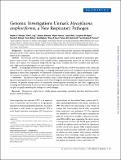Files in this item
Genomic investigations unmask Mycoplasma amphoriforme, a new respiratory pathogen
Item metadata
| dc.contributor.author | Gillespie, Stephen H | |
| dc.contributor.author | Ling, Clare L | |
| dc.contributor.author | Oravcova, Katarina | |
| dc.contributor.author | Pinheiro, Miguel | |
| dc.contributor.author | Wells, Louise | |
| dc.contributor.author | Bryant, Josephine M | |
| dc.contributor.author | McHugh, Timothy D | |
| dc.contributor.author | Bébéar, Cecile | |
| dc.contributor.author | Webster, David | |
| dc.contributor.author | Harris, Simon R | |
| dc.contributor.author | Seth-Smith, Helena M B | |
| dc.contributor.author | Thomson, Nicholas R | |
| dc.date.accessioned | 2014-11-18T10:31:02Z | |
| dc.date.available | 2014-11-18T10:31:02Z | |
| dc.date.issued | 2015-02-01 | |
| dc.identifier | 157165159 | |
| dc.identifier | c611fa6e-bdda-4f89-ab91-fa5b66b42709 | |
| dc.identifier | 25344534 | |
| dc.identifier | 84922438974 | |
| dc.identifier | 000349761600017 | |
| dc.identifier.citation | Gillespie , S H , Ling , C L , Oravcova , K , Pinheiro , M , Wells , L , Bryant , J M , McHugh , T D , Bébéar , C , Webster , D , Harris , S R , Seth-Smith , H M B & Thomson , N R 2015 , ' Genomic investigations unmask Mycoplasma amphoriforme , a new respiratory pathogen ' , Clinical Infectious Diseases , vol. 60 , no. 3 , pp. 381-388 . https://doi.org/10.1093/cid/ciu820 | en |
| dc.identifier.issn | 1058-4838 | |
| dc.identifier.other | ORCID: /0000-0001-6537-7712/work/39477857 | |
| dc.identifier.uri | https://hdl.handle.net/10023/5783 | |
| dc.description | Funding: The Wellcome Trust [grants 098051 and 097831/Z/11/B (to J. M. B., S. R. H., H. M. B. S.-S., N. R. T.)], The Medical Research Council (grant number G1000413 [to J. M. B.]), The Special Trustees of the Royal Free London, National Health Service Foundation Trust (S. H. G., T. Mc. H., C. L.), and The University of St Andrews Medical School (S. H. G., K. O.). | en |
| dc.description.abstract | Background. Mycoplasma amphoriforme has been associated with infection in patients with Primary Antibody Deficiency (PAD). Little is known about the natural history of infection with this organism and its ability to be transmitted in the community. Methods. The bacterial load was estimated in sequential sputum samples from nine patients by qPCR. The genomes of all available isolates, originating from patients in the UK, France and Tunisia, were sequenced along with the type strain. Genomic data was assembled, annotated and a high-resolution phylogenetic tree constructed. Results. By using high-resolution whole genome sequence data we show that patients can be chronically infected with M. amphoriforme manifesting as a relapsing remitting bacterial load interspersed by periods when the organism is undetectable. Importantly we demonstrate transmission of strains within a clinical environment. Antibiotic resistance mutations accumulate in isolates taken from patients who received multiple courses of antibiotics. Conclusions. Mycoplasma amphoriforme isolates form a closely related species responsible for a chronic relapsing and remitting infection in PAD patients in the UK and from immunocompetent patients in other countries. We provide strong evidence of transmission between patients attending the same clinic suggesting that screening and isolation may be necessary for susceptible patients. This work demonstrates the critical role that whole genome sequencing can play in unravelling the biology of a novel pathogen rapidly. | |
| dc.format.extent | 8 | |
| dc.format.extent | 547240 | |
| dc.language.iso | eng | |
| dc.relation.ispartof | Clinical Infectious Diseases | en |
| dc.subject | Mycoplasma amphoriformae | en |
| dc.subject | Whole genome sequencing | en |
| dc.subject | Respiratory infection | en |
| dc.subject | Infection control | en |
| dc.subject | Primary antibody deficiency | en |
| dc.subject | R Medicine | en |
| dc.subject | NDAS | en |
| dc.subject.lcc | R | en |
| dc.title | Genomic investigations unmask Mycoplasma amphoriforme, a new respiratory pathogen | en |
| dc.type | Journal article | en |
| dc.contributor.sponsor | The Wellcome Trust | en |
| dc.contributor.institution | University of St Andrews. School of Medicine | en |
| dc.contributor.institution | University of St Andrews. Global Health Implementation Group | en |
| dc.contributor.institution | University of St Andrews. Gillespie Group | en |
| dc.contributor.institution | University of St Andrews. Biomedical Sciences Research Complex | en |
| dc.contributor.institution | University of St Andrews. Infection Group | en |
| dc.identifier.doi | 10.1093/cid/ciu820 | |
| dc.description.status | Peer reviewed | en |
| dc.identifier.grantnumber | 097831/z/11/z | en |
This item appears in the following Collection(s)
Items in the St Andrews Research Repository are protected by copyright, with all rights reserved, unless otherwise indicated.

